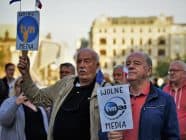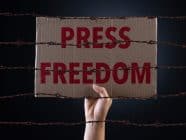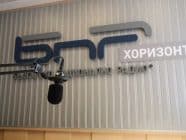 In August 1999 ActiveWatch, a member of the Reporters Without Borders network (RWB), launched a program to protect and promote free speech.
In August 1999 ActiveWatch, a member of the Reporters Without Borders network (RWB), launched a program to protect and promote free speech.
The program, called Freedom of Speaking, began publishing annual “FreeEx” reports financed by the Open Society Institute (OSI) in 2000. The most recent report, released in early May 2012, covers Romanian mass-media, specifically targeting areas of aggression and threatening behavior towards journalists. The report, which points out that Romania is 47th in the RWB’s 2011 Press Freedom Index, outlines possible solutions to the increasing politicization of media within Romania.
The Romanian FreeEx report specifies that industry politicization in the run up to the 2012 election has had an enormous editorial impact on free speech. The media market remains dominated by business people who are interested in obtaining political and economical advantages and who are willing to invest large sums of money in order to attain these aims.
The state is again one of the main actors in the publicity market, a position reached via preferential contracts granted without transparency. According to the report, “publicity from public funds was again used as a vehicle for promoting political actors. The dramatic decline of publicity budgets in the business sector increased the importance of publicity from public money, not to mention public institutions again becoming relevant market players (approximately 35 million euro).”
The report specifies that the Romanian Television News Bulletin (TVR) didn’t succeed in freeing itself from the stigma of political control while also pointing out that the former director of the TVR and most Romanian public television commentators are known for their favorable opinions of the government party. The ActiveWatch report is meant to attract attention to the fact that pressure has been exerted on TVR management, from leaders with and without power. Financial problems have again ignited discussions regarding the necessity to reform this institution, but politicians abandoned modifications to current law. Due to a reliance on political stability, the first step in transforming TVR into an independent public television service is in limbo.
At the same time, ActiveWatch continues to put pressure on politicians who promote legislative initiatives aimed at restraining press freedom and intimidating journalists. For example, the Liberal Democratic Party (PDL) deputy Mihail Boldea, proposed modifications to Law 544/2001 and to the penal code in order to exclude the public interest category, stipulating that data from the files found in the criminal prosecution stage or on the role in the court of justice, may not be released until pronouncing a final criminal sentence.
The report also reported that journalists continued to be harassed from all stages of society – from politicians and forces of order, to the general public. The era of the Civil Code which began in the autumn of 2011, brought with it new restrictions which have proved to be abusive to freedom of speech.
The abundance of televisions and the presence of international trusts in Romania
Despite the abundance of television offerings in Romania, the FreeEx report observed that diversity of editorial content is low. Given that over 80 percent of the population uses television as their main information source, the report refers to the deterioration of quality journalism due to corruption from political partisanship, cheap sensationalism, and exploitation. As stations chase to capture ratings, reports of news fabrication, scandals among politicians and exploitation of tragic events are common – not to mention the promotion of defamatory discourse intended for vulnerable groups.
At the same time, the press showed a reduced concern for topics of major interest, including stories that uncovered abuses of journalists at the hands of government authorities. In addition, the FreeEx report mentions, “the topic of secret CIA prisons (covered weakly by the media), and the abuse of force against attempts of civic protest or the Roșia Montana Gold Corporation (RMGC) case.”
In this context, the report refers to the fact that Romanians lost confidence in the press, especially regarding TV content. According to a Romanian Institute for Evaluation and Strategy (IRES) survey, 83 percent of the adult population in Romania watches TV daily, three quarters believe stations are willing to transmit anything for the audience’s sake, and 65 percent think that television programming is manipulative.
However, another IRES study reveals that most Romanians (81 percent) receive information about politics especially from television. With regard to international trust in Romania, the report mentions the fact that large international press trusts continue to restrict activity in Romania because of the crisis and disloyal competition. The report mentions the German concern Westdeutsche Allgemeine Zeitung (WAZ), which withdrew from Romania after stating, “mass-media in Romania is in the hands of some oligarchs…business people who won their money in other sectors, usually during privatization”.
Editorial management
ActiveWatch also claimed that the quality of the management act was unsatisfactory because press managers didn’t succeed in finding economical recovery solutions when publicity money diminished and patron-investment declined. The solutions proposed, often consisted of sacrifices to the journalistic act, either in favor of publicity clients or in favor of financiers whose economic and political interests came before their professional ones.
According to the ActiveWatch report, “the most flagrant act of sacrifice of the editorial space in favor of a publicity client remains the mediatic campaign of the Roşia Montană Gold Corporation, which didn’t stop with the inundation of political commercials, but also invaded the editorial space with masked publicity and generated the quasi disappearance of critical information addressing the mining project.”
Moreover, the aggravation of economical conditions from the media market closed publications, reduced job availabilities, spurred reductions to salaries and increased work conflicts – most notably among the written press. Being under tough economical pressure, the redactions were ripe for compromise, with serious consequences over the continual and accentuated degradation of editorial content.
Recommendations contained in the FreeEx report
ActiveWatch recommends in their report that media owners invest in the professionalization of the field in order to ensure journalists and editors have a free and independent workspace. The report underlines that journalists are vulnerable but they must refuse to tolerate the abuses of mass-media patrons in order to preserve public confidence in the media.
With regards to politicians, authorities, and the business environment, ActiveWatch recommends heightened respect towards editorial independency and support of the press, in order to promote the creation of relevant and verifiable editorial content. At the same time, ActiveWatch recommends that Romanian press become digitized, because of the obvious mass-migration of readers from print to online sources.
Tags: ActiveWatch, Calumny, Digital Media, Press Managers, Reporters without Borders, Romanian Media, WAZ












































